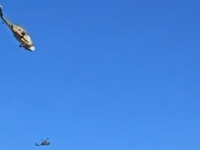With the long-awaited pullout of Israeli troops from Lebanon, the death of its old Syrian protector Hafez Al-Assad and Rafiq Hariri's surprise return to government, the year 2000 would have been a tumultuous crossroads of new hopes for Beirut. But the year did not get off to a good start. Israeli air raids on the country's infrastructure, coming as retaliation to Hezbollah militants' attacks on Israeli soldiers in southern Lebanon, only aggravated an already deep economic recession.
On May 24, the last Israeli troops withdrew in a four-day operation from the 800 square kilometers (308 square miles) they occupied in southern Lebanon for 22 years in defiance of UN Resolution 425. But the outburst of violence many feared didn't happen and the pullout was orderly, despite the collapse of Israel's proxy South Lebanon Army militia and the flight of 6,500 Lebanese to Israel.
Hezbollah captured the freed areas in southern Lebanon without a drop of blood, handing the remaining "collaborators" over to Lebanese authorities. The events gave great pride to the Lebanese and were welcomed as a landmark victory by the Arab world, not used to seeing Israel relinquish territories without anything in return. The major tension surrounding the withdrawal was Lebanon's consistent refusal to send troops into the former Israeli-occupied zone, despite pressure from Western countries and the United Nations.
When the UN Interim Force in Lebanon deployed troops at the border in early August, Lebanon claimed the withdrawal was not complete. Hezbollah announced it would continue its action in order to free the Shebaa Farms, an area that Israel captured from Syria in 1967 but is now claimed by Beirut.
Tension stepped up late in the year, with growing risks of the Israeli-Palestinian conflict extending to Lebanon. Israel has issued repeated warnings after Hezbollah snatched three Israeli soldiers in October and killed one November 26.
Some observers reckon Beirut's firmness toward Israel and the West has been prompted by Syria, which cannot afford to lose its Lebanese trump card in its dispute with Israel over the Golan Heights. Once the Israeli archenemy had left, a justification had to be found for the presence of 35,000 Syrian troops on Lebanese soil. As soon as April, Syria had anticipated the Israeli pullout by withdrawing some of its troops.
Two weeks after the pullout of Israeli troops, on June 10, long-ruling Syrian leader Hafez Al-Assad died. Although he was succeeded by his son Bashar, the death of Syria's "iron man" was inevitably going to change the rules of the game in Lebanon. Anti-Syrian militants received a further boost with former president Amin Gemayel's return from exile in July and Prime Minister Salim Hoss' electoral defeat. In September, supporters of the banned Christian militia Lebanese Forces and later bishops of the Maronite church, the main Christian community in Lebanon, called for a withdrawal of Syrian troops.
On October 26, former prime minister Rafiq Hariri, who had been forced to resign after a row with President Emile Lahud in November 1998, came back to form a government which rapidly took a series of radical measures to boost the country's ailing economy. Billionaire Hariri's liberalization program included a full opening of air traffic to competition, substantial cuts on customs duties, and a revival of negotiations for a trade agreement with the European Union.
But one of the most significant signs of change in Lebanon came in early November, when the sensitive issue of a Syrian withdrawal was brought up for the first time in parliament, by the opposition during the vote of confidence debate. Even Damascus's traditional ally, Druze leader Walid Jumblatt, asked for a redeployment of Syrian troops, who have been in Lebanon since 1976, and for less Syrian involvement in the country's affairs. Since then, Syrian troops have continued their redeployment, although Damascus has not openly admitted it.
Despite the changes over the year, Lebanese morale remains low, with thousands of young Lebanese graduates flocking out of the country each month, disappointed that prosperity has failed to return a full decade after civil war ended. — (AFP, Beirut)
by Pascal Mallet
© Agence France Presse 2000
© 2000 Mena Report (www.menareport.com)








